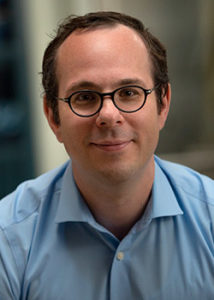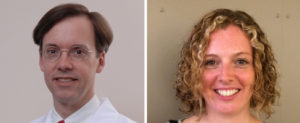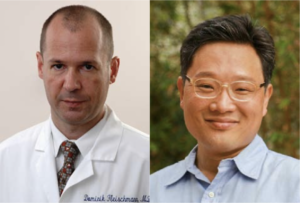
CEDSS: “Multicancer detection of early-stage cancers with simultaneous tissue localization using a plasma cfDNA-based targeted methylation assay”
Eric Fung, M.D., Ph.D.
Senior Medical Director
GRAIL, Inc.
Please see zoom details below:
Meeting URL: https://stanford.zoom.us/j/230531527
Dial: +1 650 724 9799 (US, Canada, Caribbean Toll) or +1 833 302 1536 (US, Canada, Caribbean Toll Free)
Meeting ID: 230 531 527
ABOUT
Dr. Eric Fung is Vice President, Clinical Development at GRAIL, where he leads several clinical development programs in support of the development of a blood-based multi-cancer detection test. Dr. Fung has previously held clinical development and R&D leadership roles at Affymetrix, Vermillion, Ciphergen, and Roche Molecular Diagnostics. Dr. Fung has led clinical trials leading to FDA clearance of multiple IVD products. Dr. Fung received his MD, PhD from the Johns Hopkins University School of Medicine.
Hosted by: Sanjiv Sam Gambhir, M.D., Ph.D.
Sponsored by the Canary Center & the Department of Radiology
Stanford University – School of Medicine

Dear WMIS trainees, colleagues and friends,
We welcome you to join our upcoming virtual WMIS – Stanford Diversity conference on September 9-11, 2020. We are coming together to reinforce our commitment to diversity and to provide a forum for our team members to engage in meaningful discussions. The conference will provide keynote lectures, scientific presentations and educational lectures from leaders and pioneers in the field, who will discuss important topics related to racial justice, women in STEM and Global Health. We are also offering breakout sessions whereby carefully selected individuals will facilitate a discussion about how to implement more supportive and inclusive practices into our daily professional and personal life. The breakout sessions are designed to enable active involvement of smaller groups where people feel safe to discuss current challenges in the STEM field and actionable solutions.
This conference is free of charge and will provide 9.5 CME credits. Abstracts of all conference presentations and a summary of discussion points and insights provided by all conference participants will be published in Molecular Imaging & Biology. The organizing committee will provide 10 trainee prizes in the form of free WMIS memberships to conference attendants for the 2021 WMIC in Miami.
Website: https://www.wmislive.org

CEDSS: “The Origins and Detection of Lethal Prostate Cancer”
Paul Boutros, Ph.D., M.B.A.
Director, Cancer Data Sciences
UCLA
Please see zoom details below:
Meeting URL: https://stanford.zoom.us/s/93515779500
Dial: +1 650 724 9799 or +1 833 302 1536
Meeting ID: 935 1577 9500
Meeting Passcode: 767148
ABOUT
Boutros earned his B.Sc. degree from the University of Waterloo in Chemistry in 2004, and his Ph.D. degree from the University of Toronto, Canada, in Medical Biophysics in 2008. At Toronto, he also earned an executive M.B.A. from the Rothman School of Management. In 2008, Boutros started his independent research career at the Ontario Institute for Cancer Research first as a fellow (2008–2010) and then as principal investigator (2010–2018). He moved to California to join the UCLA faculty in 2018.
Hosted by: Utkan Demirci, Ph.D.
Sponsored by the Canary Center & the Department of Radiology
Stanford University – School of Medicine

Radiology Department-Wide Research Meeting
• Curt Langlotz, MD, PhD: Overview of the AIMI Center
• Brian Hargreaves, PhD: Research Details from Town Hall, Q&A, and COVID19 Updates
Location: Zoom – Details can be found here: https://radresearch.stanford.edu
Meetings will be the 3rd Friday of each month.
Hosted by: Brian Hargreaves, PhD
Sponsored by: the the Department of Radiology

CEDSS: Systematic identification of fluid-based biomarkers for ovarian and prostate cancer
Thomas Kislinger, Ph.D.
Professor & Chair
Department of Medical Biophysics
University of Toronto
Senior Scientist
Princess Margaret Cancer Centre
Zoom Webinar Details
Meeting URL: https://stanford.zoom.us/s/94878578384
Dial: +1 650 724 9799 or +1 833 302 1536
Webinar ID: 948 7857 8384
Passcode: 692692
Register Here
ABOUT
Thomas Kislinger received his MSc in Analytical Chemistry from the University of Munich, Germany (1998). He completed his PhD in 2001, investigating the role of Advanced Glycation Endproducts in diabetic vascular complications at the University of Erlangen, Germany and Columbia University, New York. Between 2002 and 2006 he completed a post-doctoral fellowship at the University of Toronto. In 2006 he joined the Princess Margaret Cancer Centre as an independent investigator. Dr. Kislinger holds positions as Senior Scientist at the Princess Margaret Cancer Centre and as Professor and Chair at the University of Toronto in the Department of Medical Biophysics. The Kislinger lab applies proteomics technologies to translational and basic cancer biology. This includes the development of novel proteomics methodologies, identification of liquid biopsy signatures and the molecular identification of novel cell surface markers.
Hosted by: Utkan Demirci, Ph.D.
Sponsored by: The Canary Center & the Department of Radiology
Stanford University – School of Medicine

Radiology Department-Wide Research Meeting
Location: Zoom – Details can be found here: https://radresearch.stanford.edu
Meetings will be the 3rd Friday of each month.
February 19 Speakers:
Bruce Daniel, MD – Center Overview: IMMERS
Jennifer McNab, PhD – Encoding and Decoding Diffusion MRI
Hosted by: Brian Hargreaves, PhD
Sponsored by: the the Department of Radiology

CEDSS: Disseminated cell hybrids as biomarkers for cancer detection, prognosis and treatment response
Melissa Wong, Ph.D.
Associate Professor and Vice Chair
Department of Cell, Development and Cancer Biology
Program Co-Lead, Knight Cancer Institute
Oregon Health & Science University
Zoom Details
Meeting URL: https://stanford.zoom.us/s/98184098662
Dial: US: +1 650 724 9799 or +1 833 302 1536 (Toll Free)
Meeting ID: 981 8409 8662
Passcode: 084321
ABSTRACT
Metastatic progression defines the final stages of tumor evolution and underlies the majority of cancer-related deaths. The heterogeneity in disseminated tumor cell populations capable of seeding and growing in distant organ sites contributes to the development of treatment resistant disease. We recently reported the identification of a novel tumor-derived cell population, circulating hybrid cells (CHCs), harboring attributes from both macrophages and neoplastic cells, including functional characteristics important to metastatic spread. These disseminated hybrids outnumber conventionally defined circulating tumor cells (CTCs) in cancer patients. It is unknown if CHCs represent a generalized cancer mechanism for cell dissemination, or if this population is relevant to the metastatic cascade. We detect CHCs in the peripheral blood of patients with cancer in myriad disease sites encompassing epithelial and non-epithelial malignancies. Further, we demonstrate that in vivo-derived hybrid cells harbor tumor-initiating capacity in murine cancer models and that CHCs from human breast cancer patients express stem cell antigens, features consistent with the ability to seed and grow at metastatic sites. We reveal heterogeneity of CHC phenotypes reflect key tumor features, including oncogenic mutations and functional protein expression. Importantly, this novel population of disseminated neoplastic cells opens a new area in cancer biology and renewed opportunity for battling metastatic disease.
ABOUT
The research focus of the Wong laboratory revolves around understanding the regulatory mechanisms that control epithelial stem cell homeostasis and their expansion in developmental, homeostasis and disease contexts, including cancer. I have substantial training and experience in intestinal stem cell investigation leveraging in vivo and ex vivo modeling, as well as in myriad cutting edge technologies (i.e. cyCIF, scRNA-seq). My publication record spans my post-doctoral fellowship in Dr. Jeffrey Gordon’s laboratory at Washington University School of Medicine, to studies in my own laboratory at Oregon Health & Science University. Our research impacts the understanding of regulatory mechanisms that govern cell state in the context of the evolving tissue microenvironment and changing cell signaling landscape, in development and disease.
Our studies in stem cell regulation led to the intriguing finding that stem cells can fuse with tissue macrophages in the context of injury repair and may impact tissue regeneration. We have extended these findings to the cancer setting, where cancer-macrophage fusions are detectible in primary and metastatic tumors, and my group recently identified and characterized these cells as a novel circulating tumor cell population. Importantly, our studies in cell culture, in mice and humans provide an indepth evaluation of hybrid cells to set the foundation for continued investigations into their biology, impact on disease progression or tissue regeneration, and use as a biomarker for disease burden. Importantly, we coined the term, circulating hybrid cell (CHC) for this novel population and reported they exist at higher levels than conventionally defined circulating tumor cells in the peripheral blood of cancer patients. This work was published in 2018 and highlighted by Science Magazine as one of the top ten publications in the cancer field in the science family journals. The science proposed in this U01 application leverage hybrid cell biology to assess treatment response and resistance in breast cancer patients undergoing targeted therapy. Our proposal leverages active collaborations with Dr. Young Hwan Young’s group to synergize biology with computation, as well as a number of other valuable collaborators to ensure success of the proposed, cutting-edge science.
Hosted by: Utkan Demirci, Ph.D.
Sponsored by: The Canary Center & the Department of Radiology
Stanford University – School of Medicine

Radiology Department-Wide Research Meeting
• Dominik Fleischmann, MD: 3DQ Lab Overview
• Tom Soh, PhD: Research Updates
Location: Zoom – Details can be found here: https://radresearch.stanford.edu
Meetings will be the 3rd Friday of each month.
Hosted by: Brian Hargreaves, PhD
Sponsored by: the the Department of Radiology

Radiology Department-Wide Research Meeting
• Research Announcements
• Michelle James, PhD – Detecting and Tracking Immune Responses in the Brain and Beyond using PET
• Ryan Spitler, PhD – Precision Health and Integrated Diagnostics (PHIND) Center
Location: Zoom – Details can be found here: https://radresearch.stanford.edu
Meetings will be the 3rd Friday of each month.
Hosted by: Brian Hargreaves, PhD
Sponsored by: the the Department of Radiology

Targeted violence continues against Black Americans, Asian Americans, and all people of color. The department of radiology diversity committee is running a racial equity challenge to raise awareness of systemic racism, implicit bias and related issues. Participants will be provided a list of resources on these topics such as articles, podcasts, videos, etc., from which they can choose, with the “challenge” of engaging with one to three media sources prior to our session (some videos are as short as a few minutes). Participants will meet in small-group breakout sessions to discuss what they’ve learned and share ideas.
Please reach out to Marta Flory, flory@stanford.edu with questions. For details about the session, including recommended resources and the Zoom link, please reach out to Meke Faaoso at mfaaoso@stanford.edu.